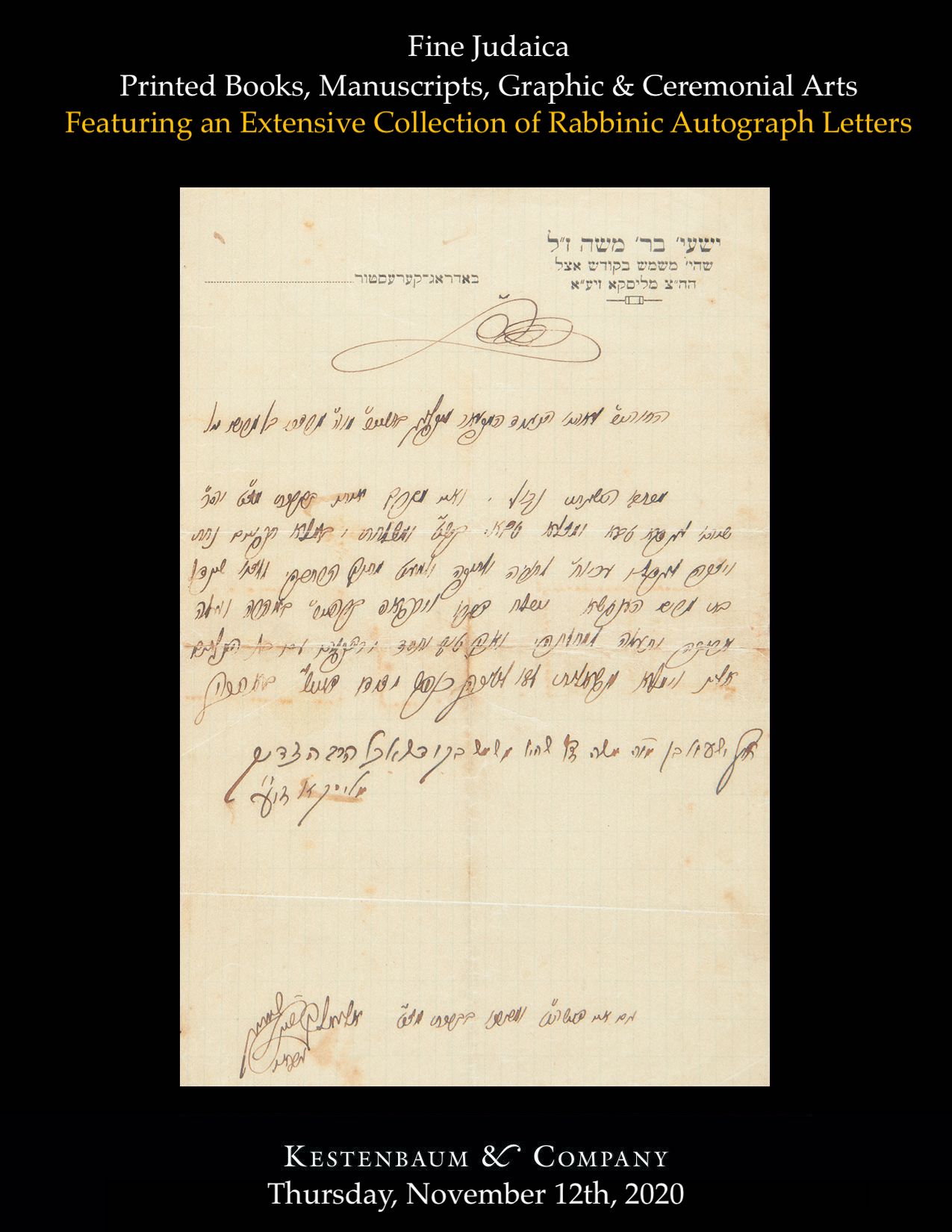(Founder of German neo-Orthodoxy, 1808-88). <<Personal Chumash, filled with autograph family records.>>

Auction 91 |
Thursday, November 12th,
2020 at 1:00pm
Fine Judaica: Printed Books, Manuscripts, Graphic & Ceremonial Arts Featuring an Extensive Collection of Rabbinic Autograph Letters.
Lot 60
HIRSCH, SAMSON RAPHAEL
(Founder of German neo-Orthodoxy, 1808-88). <<Personal Chumash, filled with autograph family records.>>
Venice: Daniel Bomberg 1548
Est: $12,000 - $18,000
PRICE REALIZED $20,000
<<Highly significant: The very volume in which Rabbi Samson Raphael Hirsch entered all his personal family history.>>
As an antiquarian volume two-and-a-half centuries older than Rabbi Hirsch himself, the book includes many other former ownership marks. The very earliest is dated 1565. Another early owner recorded the names and birthdays of his seven sons and daughters born between the years 1605-12. A 17th century beautifully ornamented inscription reads: “I am Moses Isaiah of Hildesheim.”
It is possible that R. Hirsch, seeing these inscriptions made long before him, with typical historical conscientiousness, decided to continue such a practice, utilizing this rare Bomberg Chumash to record his own children’s births. In so doing, R. Hirsch would have encapsulated the crux of his life’s work in these few pages, dedicated as he was to advancing the traditions of centuries past, yet attaching to them his distinct imprint, suitable to his own particular epoch.
<<FAMILY RECORD:>>
The birth of each child is followed by a fervent wish in R. Hirsch’s hand that God permit him and his wife raise the child to: “Torah, bridal canopy and good deeds” (boys) and: “Fear of God, bridal canopy and good deeds” (girls). These prayers were duly realized, for in his Will, R. Hirsch expressed great pleasure having seen his children grow in the ways of their ancestors. Indeed, he wrote in his ethical will, there was no need to exhort his children to follow the Torah fastidiously - as they were already doing so. Rather, he beseeched his children to stay loyal to each other come what may.
R. Hirsch often records after each birth or circumcision a location. Thus, we may follow the growing family as it traveled from Oldenburg to Emden to Nikolsburg. Finally, with the birth of R. Hirsch’s youngest children - the twins Sophie and Jenny - Frankfurt on the Main is entered. At this point in R. Hirsch’s career, the still youthful rabbi would have had little idea the extent to which his own name and legacy would become so enmeshed with the name of the city he had just recorded in this volume.
In addition to noting the Hebrew dates of birth, R. Hirsch would add the secular date in parenthesis, at first in Hebrew letters and in his later years, in Latin letters. Following the birth of his grandson Paltiel (son of Rabbi Dr. Tzvi Hirsch and Julia Plato), a space is left blank for the secular date. Evidently, R. Hirsch, only aware of the Hebrew date at the time, intended to return and fill-in the corresponding secular date, yet never did so. The blank space remaining serves as a testament to R. Hirsch’s weltanschauung: While awareness of the greater world one lives in is a cornerstone of “Torah im Derech Eretz,” it is presaged by a complete immersion in Torah values and time frames.
Between listing his children and his grandchildren, the Hebrew dates of R. Hirsch’s parents’ Yahrtzeits (Jahrtag) are written, along with two further dates of unidentified significance.
R. Hirsch did not only document in this volume the happy days of his family’s growth, but also recorded challenges. When daughter Sarah became deathly ill at the age of two, R. Hirsch notes her name was changed to Rachel. Fortunately, the illness passed and R. Hirsch writes: ‘“And the Lord heard our cries” - and his daughter lived. “May God lengthen her years with pleasantness and may she grow to be a God-fearing Woman of Valor with aged, venerable years.”
Sadly, not all challenges resolved themselves. Three weeks after his son Raphael was born, R. Hirsch writes: “God took what He has given me, Monday, 4th of Nissan (5)601 (March 26th, 1841). May his soul be bound up in the bond of life and may he receive his portion in the end of days.” This is a most important historical revelation. In all biographies (eg E.M. Klugman (Artscroll, 1996) p. 345) the child who passed away in infancy is said to have been a daughter. Yet here, R. Hirsch’s own hand refutes this account; indeed he even includes the date of the baby boy’s circumcision and the name of the Mohel.
Equally heartbroken over the baby’s death was of course the young boy’s mother, Johanna, who was said to have held on to one of the child’s garments for years, wishing to be buried with it. Upon learning of this desire, R. Hirsch encouraged his wife to instead donate the garment to charity, so that their child’s memory might benefit the poor in this world. Johanna agreed.
R. Hirsch cherished his loving relationship with Johanna (Hanna Judel), whom he regarded as his equal partner and full confidant. On the opening blank page of the Chumash R. Hirsch records her passing: “Friday evening 2 Iyar 5642 (1882) before midnight, fell my crown, beloved of my heart, my wife, the righteous, modest, and pious Madam Hanna…The memory of her righteousness and piety will never be forgotten by her children and descendants forever after.”
<<Accompanied by:>> Samson Raphael Hirsch. <<Autograph Hebrew Manuscript.>> Novellae to Tractate Berachoth. Almost four pages. R. Hirsch’s insights on prayer, including connecting the Blessing of Redemption to the Silent Amidah; leaving the synagogue in a calm demeanor; establishing a permanent seat in the synagogue; along with other ideas.
